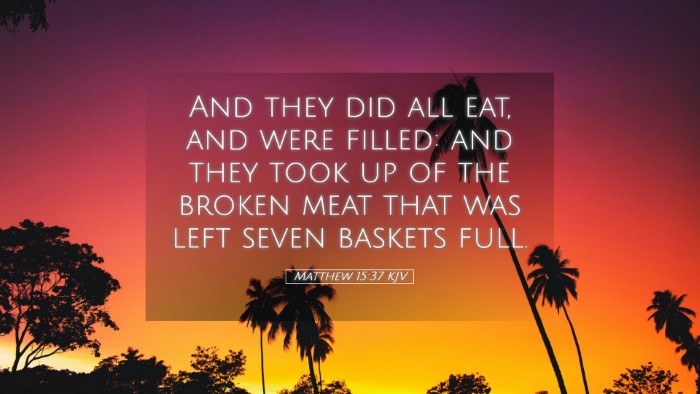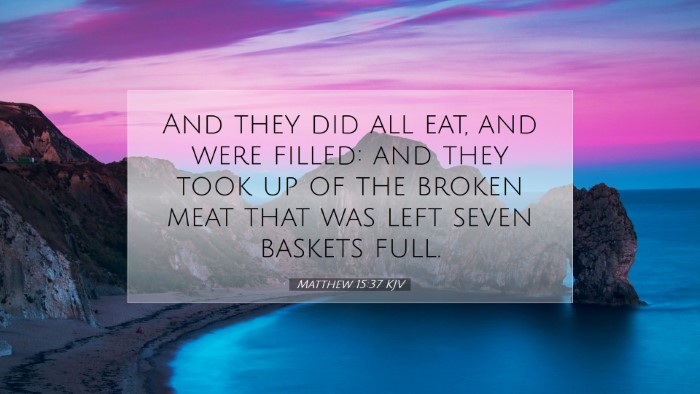Commentary on Matthew 15:37
Text of Matthew 15:37 (KJV): "And they did all eat, and were filled: and they took up of the broken meat that was left seven baskets full."
Introduction
The miracle of the feeding of the four thousand, recounted in Matthew 15:37, holds profound significance both in its historical context and its theological implications. As we explore this miraculous event, we will draw insights from several public domain commentaries, providing depth for pastors, students, theologians, and Bible scholars.
Contextual Background
This passage is situated in the ministry of Jesus, emphasizing His compassion for the multitudes and His power over physical needs. The backdrop involves Jesus’ movement through Gentile territory, specifically to the region of Decapolis, where He taught and healed many. The gathering of the four thousand signifies a crucial moment in His earthly ministry, as He reveals His identity and mission as the Messiah.
Exegesis and Commentary
1. The Feeding Miracle
Matthew Henry notes that the miracle reflects the divine provision and care Jesus offers. He emphasizes the vast number of people, highlighting that there were "four thousand men, beside women and children" (Matthew 15:38). This abundance showcases Jesus’ miraculous power over the limitations of human resources. In a similar vein, Adam Clarke remarks that the "seven baskets full" collected afterward symbolizes the completeness and sufficiency of Christ's grace, reminding us that His blessings are more than sufficient to meet our needs.
2. Theological Implications
Albert Barnes examines the deeper theological implications of this miracle, focusing on the abundance of food provided. He comments on how this act illustrates God’s generosity and the fullness of His kingdom. The "seven baskets" can be interpreted as indicative of the covenant community as represented by the Old Testament (the seven being a number of completeness). The analogous nature of this miracle to the feeding of the five thousand further signifies Jesus’ role as the Bread of Life, nurturing both physical and spiritual hunger.
3. The Reaction of the Disciples
The disciples’ role in this narrative is pivotal. Initially, they express doubt about feeding such a multitude (Matthew 15:33). Henry illustrates this doubt as indicative of a lack of faith, despite having witnessed previous miracles. Clarke further contrasts their previous experiences with this scenario, advocating that the disciples should have been empowered by their history with Jesus’ miraculous works. Their eventual participation in distributing the food represents a call to believers to play an active role in ministry, serving as tools of divine provision.
4. The Significance of 'Broken Meat' and Fullness
The phrase "broken meat" speaks to the brokenness of humanity and the need for restoration. Henry points out that every crumb represents the mercy and grace of God, which is given freely to all who seek Him. The act of gathering the leftovers is not just a practical measure but reflects God’s concern for stewardship and the need to care for what He provides. Barnes emphasizes that this serves as a lesson in divine economy, reminding the followers that in God's kingdom, nothing is wasted.
5. The Seven Baskets - Symbolism and Meaning
Exploring the symbolism of the "seven baskets," Clarke explains that their significance extends beyond the event. Seven is the number of covenant and completion, suggesting that the leftovers serve as a testament to God's overflowing provision and the promise of completeness in Christ. This mirrors the messages found in the signs of the Old Covenant, bridging the Jewish expectations of Messianic fulfillment with the new reality instituted by Jesus.
Conclusions
The feeding of the four thousand serves not only as a demonstration of Jesus’ miraculous power but also encapsulates many vital theological truths. It highlights themes of compassion, provision, and the abundance of grace available in Christ. For pastors and theologians, this narrative encourages reflection on Christ's continuous work today. It further admonishes believers to trust in His sufficiency and to engage actively in the mission of sharing His bounty with a hungry world.
Applications for Ministry
- Trust in God's Provision: Encourage congregations to place reliance on God’s ability to provide in their lives.
- Ministry as Service: Emphasize the importance of active participation in ministry as we distribute His blessings.
- Sabbath Rest in Abundance: Reflect on the Biblical principle of abundance, exploring how it leads to spiritual rest and fulfillment.
- Inclusivity in Care: Address the need for compassion and care for all, paralleling Jesus’ ministry to both Jews and Gentiles.


